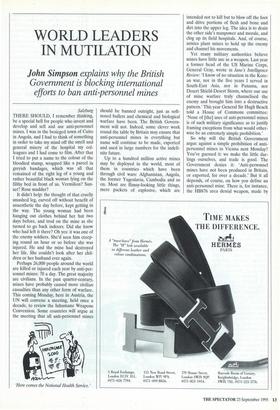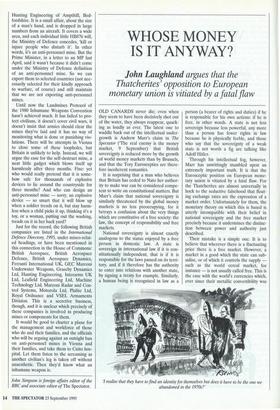WORLD LEADERS IN MUTILATION
John Simpson explains why the British
Government is blocking international efforts to ban anti personnel mines
Salzburg THERE SHOULD, I remember thinking, be a special hell for people who invent and develop and sell and use anti-personnel mines. I was in the besieged town of Cuito in Angola, and I had to think of something in order to take my mind off the smell and general misery of the hospital my col- leagues and I had come to film. After that I tried to put a name to the colour of the bloodied stump, wrapped like a parcel in greyish bandages, which was all that remained of the right leg of a young and rather beautiful black woman lying on the filthy bed in front of us. Vermilion? Sun- set? Rose madder?
It didn't help: the thought of that cruelly smashed leg, carved off without benefit of anaesthetic the day before, kept getting in the way. The young woman had been hanging out clothes behind her but two days before, and trod on the mine as she turned to go back indoors. Did she know who had left it there? Oh yes: it was one of the enemy soldiers. She'd seen him creep- ing round an hour or so before she was injured. He and the mine had destroyed her life. She couldn't look after her chil- dren or her husband ever again.
Perhaps 26,000 people around the world are killed or injured each year by anti-per- sonnel mines: 70 a day. The great majority are civilians. In the past quarter-century, mines have probably caused more civilian casualties than any other form of warfare. This coming Monday, here in Austria, the UN will convene a meeting, held once a decade, to review the Inhumane Weapons Convention. Some countries will argue at the meeting that all anti-personnel mines 'Here comes the Notional Health Service.' should be banned outright, just as soft- nosed bullets and chemical and biological warfare have been. The British Govern- ment will not. Indeed, some clever work round the table by Britain may ensure that anti-personnel mines in everything but name will continue to be made, exported and used in large numbers for the indefi- nite future.
Up to a hundred million active mines may be deployed in the world, most of them in countries which have been through civil wars: Afghanistan, Angola, the former Yugoslavia, Cambodia and so on. Most are flimsy-looking little things, mere packets of explosive, which are intended not to kill but to blow off the foot and drive portions of flesh and bone and dirt into the upper leg. The idea is to drain the other side's manpower and morale, and clog up its field hospitals. And, of course, armies plant mines to hold up the enemy and channel his movements.
Yet many military authorities believe mines have little use as a weapon. Last year a former head of the US Marine Corps, General Gray, wrote in Jane's Intelligence Review: 'I know of no situation in the Kore- an war, nor in the five years I served in South-East Asia, nor in Panama, nor Desert Shield-Desert Storm, where our use of mine warfare truly channelised the enemy and brought him into a destructive pattern.' This year General Sir Hugh Beach told a House of Commons committee: `None of [the] uses of anti-personnel mines is of such military significance as to justify framing exceptions from what would other- wise be an extremely simple prohibition.'
So why will the British Government argue against a simple prohibition of anti- personnel mines in Vienna next Monday? You've guessed it: we make the little dar- lings ourselves, and trade is good. The Government denies it: Anti-personnel mines have not been produced in Britain, or exported, for over a decade.' But it all depends, of course, on how you define an anti-personnel mine. There is, for instance, the HB876 area denial weapon, made by Hunting Engineering of Ampthill, Bed- fordshire. It is a small affair, about the size of a man's hand, and is dropped in large numbers from an aircraft. It covers a wide area, and each individual little HB876 will, the Ministry of Defence concedes, 'kill or injure people who disturb it'. In other words, it's an anti-personnel mine. But the Prime Minister, in a letter to an MP last April, said it wasn't because it didn't come under the Ministry of Defence definition of an anti-personnel mine. So we can export them to selected countries (not nec- essarily selected for their kindly approach to warfare, of course) and still maintain that we are not exporting anti-personnel mines.
Until now the Landmines Protocol of the 1980 Inhumane Weapons Convention hasn't achieved much. It has failed to pro- tect civilians, it doesn't cover civil wars, it doesn't insist that armies should clear the mines they've laid and it has no way of monitoring what is done or punishing vio- lations. There will be attempts in Vienna to close some of these loopholes, but Britain is unlikely to help. Instead, we will argue the case for the self-destruct mine, a neat little gadget which blows itself up harmlessly after three months. Fine: yet who would really pretend that it is some- how safe for thousands of explosive devices to lie around the countryside for three months? And who can design an anti-personnel mine — sorry, an explosive device — so smart that it will blow up when a soldier treads on it, but stay harm- less when a child picks it up, thinking it's a toy, or a woman, putting out the washing, treads on it in her back yard?
Just for the record, the following British companies are listed in the International Defence Directory, 1995, under mines-relat- ed headings, or have been mentioned in this connection in the House of Commons: British Aerospace, British Aerospace Defence, British Aerospace Dynamics, Ferranti International UK, GEC Marconi Underwater Weapons, Graseby Dynamics Ltd, Hunting Engineering, Interarms UK Ltd, Leafield Engineering Ltd, Machine Technology Ltd, Marconi Radar and Con- trol Systems, Motorola Ltd, Plalite Ltd, Royal Ordnance and VSEL Armaments Division. This is a secretive business, though, and it is unclear which precisely of these companies is involved in producing mines or components for them.
It would be good to charter a plane for the management and workforce of those who do and their families, and the officials who will be arguing against an outright ban on anti-personnel mines in Vienna and their families, and take them to Cuito hos- pital. Let them listen to the screaming as another civilian's leg is taken off without anaesthetic. Then they'd know what an inhumane weapon is.
John Simpson is foreign affairs editor of the BBC and associate editor of The Spectator.



































































 Previous page
Previous page